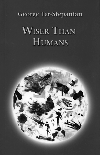
Wiser Than Humans
George Ter-stepanian
Editions Antaeus
$24.99
paper
324pp
978-0-9810444-1-5
George Ter-Stepanian, who died in 2006, was an eminent scientist in the field of soil mechanics and engineering geology, as well as a prominent scholar and professor. Over the span of a long career, he witnessed the impact human activity had on the environment. Until the end of his life he was deeply concerned about the future of the planet. His greatest achievement was the preservation of nature and the environment in Armenia, because of his successful opposition to a government plan that would over-use the water supply of Lake Sevan, and to the construction of a dumpsite for radioactive waste in the Ararat Valley.
In Wiser Than Humans, Ter-Stepanian uses the novel as a vehicle to present his views on humanity and its effect on the planet. The novel opens with the “Second International Congress on Environmental Protection and the Development of Humanity” in Miami in 2015. The scientists present feel that they are preaching to the choir, that no one is listening to their cries of despair. But the Dorils are listening. The Dorils, intelligent giant sea creatures, have been pushed further and further into the depths of the ocean, beset by pollution and overfishing. Although humans can still find some clean places on earth to retreat to, the oceans are no longer self-cleaning. The earth is hurtling towards destruction, with little real opposition.
Ter-Stepanian uses scientists as his protagonists in order to explain theories, taking the reader along for the ride. The explanations are just right: enough information to understand the various problems that exist, but not so much that the reader is turned off by jargon. Although not everyone will agree with all of the author’s ideas and theories, there is much food for thought in Wiser Than Humans.
And, unusually for a book that deals with environmental crisis, at the close of the book, there is hope.
Alas, in the epilogue, the author points out that we have no beings “wiser than humans” to help us through our crisis, and we must come to our senses on our own. mRb






0 Comments